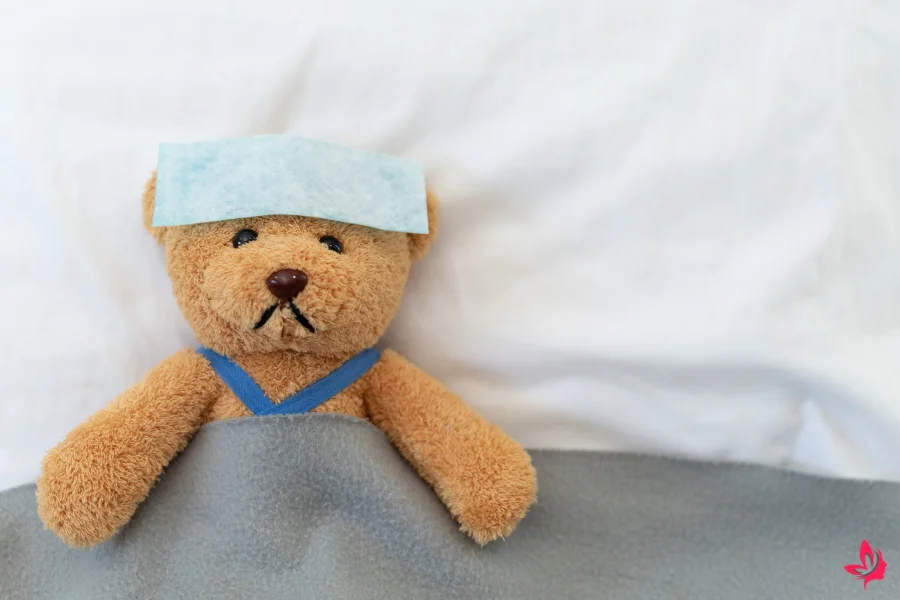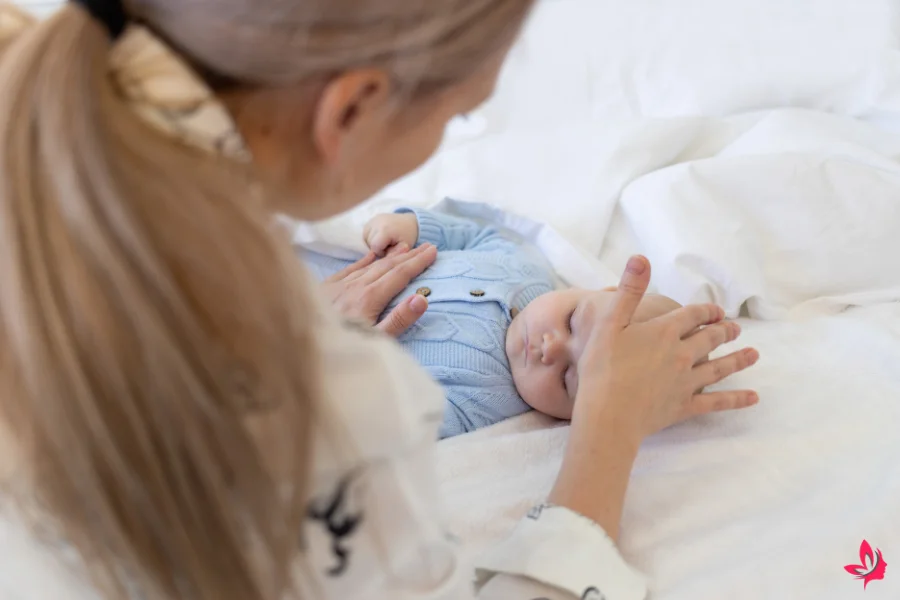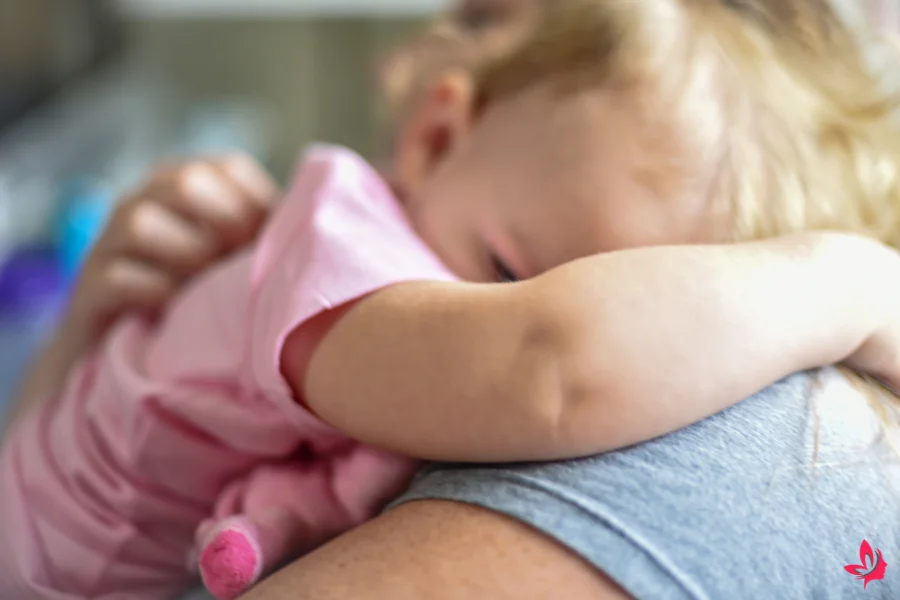Should I let my sick baby sleep all day? Many parents worry about this when their child isn’t feeling well.
Allowing a sick baby to sleep more can help their body recover. However, parents should monitor for any signs of distress or complications.
Parents will find practical advice on when to let their baby rest and when to seek medical help.
When babies fall ill, their sleep patterns can significantly change. Recognizing when these changes are normal and when they might require attention is crucial.
During these times, parents must explore strategies to balance their baby’s sleep needs with the importance of other elements, like proper hydration and medication.
Understanding how to best care for sick babies involves more than just letting them sleep. Caregivers can ensure their baby recovers comfortably and safely by reviewing expert tips and knowing when to consult a healthcare professional.
Comprehending Baby Sleep Patterns

Understanding infant sleep patterns is crucial for new parents.
Young babies often have irregular sleep patterns. They experience more light and shorter sleep cycles than adults. This can lead to frequent night wakings, which is normal.
Babies have a natural circadian rhythm, but it takes time to develop fully. By about four months, many infants start to sleep more consistently.
Until then, parents might notice varied sleep patterns, including short naps and frequent night feedings.
Parents might wonder about letting their sick babies sleep more. Extra sleep can be beneficial for recovery, especially during flu season when runny or congested noses are common.
However, monitoring the baby for signs of dehydration or a high fever is important. In such cases, medical advice should be sought.
Providing extra comfort is key to helping a baby sleep well, especially if the baby has a sore throat or ear infection.
A cool-mist humidifier can help ease a stuffy nose, promoting better sleep. Ensuring the baby’s room is calm and has a good sleep environment contributes to healthier sleep habits.
Parents should maintain a consistent routine to help the baby adapt to normal sleeping patterns after illness.
This includes keeping daytime sleep structured with regular nap times and ensuring a smooth bedtime routine.
Medical professionals can offer valuable expert advice on handling infant sleep during sickness. Always consult a healthcare provider if you have concerns about the baby’s health or sleep habits.
Recognizing Signs of Illness in Babies

Recognizing the signs of illness in babies is crucial for parents, especially new parents.
Sick babies often show signs like a runny nose, fever, or cough. If a baby has a high fever or appears listless, it is wise to consult a healthcare provider.
Fever in a baby can be a sign of the body fighting off infection.
Be alert for symptoms such as sore throat, ear infection, or lack of wet diapers, which can signal dehydration.
If a baby has fewer wet diapers or trouble breathing, these could be signs of a more serious illness. Medical advice is necessary at this time.
Babies may also experience changes in sleep habits. During sickness, they might take longer naps or have shorter wake windows.
While extra sleep can support the body’s immune system, understanding the right amount of sleep is essential for maintaining a child’s health.
Other common signs include vomiting, diarrhea, or persistent crying.
Recognizing these can help ensure a baby’s overnight sleep is as uninterrupted and peaceful as possible.
If a baby continues to have trouble sleeping despite extra comfort measures, expert advice may help.
Consider seeking immediate medical attention if your baby has difficulty staying comfortable and alert.
Resources like the American Academy of Pediatrics can provide additional guidance and help new parents understand when to seek help.
Balancing Sleep and Care for a Sick Baby

Managing their sleep and symptoms effectively is important when caring for a sick baby.
Paying attention to fever, hydration, and nutrition can aid recovery and allow the immune system to fight off illness more effectively.
Monitoring Fever and Symptoms
A high fever can be worrisome, especially in young children and sick babies.
Parents should closely monitor for signs like a runny nose, stuffy nose, or sore throat.
Using a reliable digital thermometer to check your baby’s temperature regularly is important.
If the fever rises above 100.4°F or persists, seeking medical advice is crucial.
Extra comfort can also help.
A cool-mist humidifier may ease breathing issues and maintain a comfortable sleep environment.
Observing any changes in symptoms and seeking medical attention if symptoms worsen can help you effectively manage your baby’s condition.
Maintaining Hydration and Nutrition
Hydration is essential for sick babies, so ensuring frequent feedings is vital.
Breast milk or formula provides necessary nutrients and maintains hydration.
Offering bland options such as applesauce and bananas may be easier for babies to digest on solid foods. These nutritious choices support the baby’s immune system.
Signs of dehydration, like fewer wet diapers or a dry mouth, should be closely watched.
Pediatricians recommend offering small but frequent sips of fluids if babies are reluctant to eat.
Creating a consistent feeding and sleeping routine, aligning with the American Academy of Pediatrics guidelines, helps manage hydration while improving your child’s sleep schedule.
Creating a Comfortable Sleeping Environment

Should I let my sick baby sleep all day? Young children often need more rest during illness to support their immune system.
Crafting a cozy space ensures they receive beneficial sleep, even if they require longer naps due to a stuffy nose or high fever.
The right temperature in the baby’s room can make a huge difference.
A cool-mist humidifier may ease breathing for sick babies, especially with nasal congestion or ear infections, promoting better sleep.
Providing extra comfort with soft bedding and a favorite blanket can help keep the baby relaxed.
Nighttime sleep often improves when babies feel secure, crucial during flu season or when dealing with symptoms like a sore throat.
Consistency in a sleep routine aids sick children’s recovery.
Encourage a regular schedule that includes nap times and bedtime routines, even during sick days. This will help them maintain their circadian rhythm and sleep patterns, benefiting their overall health.
Many sick babies have trouble sleeping due to symptoms, so using a nasal aspirator or offering extra breast milk feedings before sleep might help soothe them.
For new parents seeking expert advice, trusted resources suggest maintaining a sleeping environment that aligns with typical sleep training methods.
The American Academy of Pediatrics emphasizes safe sleep practices for infants. It reinforces the importance of an independent sleeper arrangement and monitors signs of dehydration or distress in the middle of the night.
When to Seek Medical Attention

When considering whether a sick baby should sleep all day, it is important to differentiate between normal and excessive sleepiness.
Recognizing the warning signs that require medical attention is vital. Monitoring symptoms like high fever and changes in behavior ensures prompt care.
Normal Sleep vs. Excessive Sleepiness
Sick babies often need extra sleep because their little bodies work hard to fight infections. Giving them the chance to rest can help their immune systems recover more effectively.
Longer naps may be normal, especially during flu season or when a person has a sore throat or stuffy nose.
However, sure signs indicate that the baby’s sleep might be more excessive than helpful.
Regular night wakings can be expected, but if accompanied by a high fever or reluctance to wake for feedings, this could cause concern.
Keeping an eye on their daytime sleep patterns helps distinguish between healthy sleep habits and over-sleepiness.
Red Flags and Emergency Symptoms
Parents should be aware of red flags that call for immediate medical attention.
Persistent high fever, difficulty breathing, or difficulty staying awake even for short periods can indicate underlying issues that need addressing.
Symptoms such as uncontrolled crying, lack of wet diapers throughout the day, or signs of dehydration are significant.
Critical changes in condition, like refusing food, may require urgent evaluation by a medical professional.
If emergencies arise, the best way to ensure safety and provide extra comfort to the baby and the parents is to contact a healthcare provider.
For further details on when to seek help, consult this guide on seeking medical attention for sick babies.
Home Remedies and Comfort Measures

Letting a sick baby sleep all day can be essential for their recovery.
When sick babies need extra sleep, their little bodies are busy fighting illnesses like colds or ear infections. Parents must monitor their baby’s sleep needs and provide the right environment for restful sleep.
A cool-mist humidifier can help ease breathing difficulties caused by congestion or a runny nose.
This simple device moistens the air, reducing coughing and soothing sore throats. It’s beneficial during flu season when nasal congestion can prevent children from sleeping comfortably.
Breast milk or formula offers vital nutrients and extra comfort during sickness.
Ensuring a sick baby receives extra feedings can help maintain hydration and ease a sore throat. If babies show signs of dehydration, such as fewer wet diapers, they should seek medical attention.
For stuffy noses, a nasal aspirator can effectively clear blockages and promote better nighttime sleep.
This tool can help the baby breathe easier and sleep through the night with fewer interruptions.
Maintaining a consistent sleep routine can aid in creating healthy sleep habits, even on sick days.
While comfort is important, continuing with some form of the routine helps keep the sleep environment familiar.
Using a sleeping bag or swaddle can provide a sense of security and promote better sleep.
Parents should consult medical professionals for proper treatment and advice if a high fever or other severe symptoms occur. Trusting expert advice will ensure the child’s overall health and well-being.
Adapting Your Baby’s Sleep Routine When Ill

Should a sick baby sleep all day? Parents often wonder about this.
Sleep is a powerful healer. Sick babies may need more rest to recover, as sleep supports the immune system.
Extra sleep is common during illness. Longer naps and frequent rest can help little bodies fight off infections. Letting them rest as much as needed is crucial unless medical professionals advise otherwise.
Sometimes, sick children experience discomfort from symptoms like a sore throat or runny nose. To help maintain a consistent routine.
This provides stability and signals it’s time to unwind, even during sick days.
Creating a soothing sleep environment can make a huge difference. Try using a cool-mist humidifier.
It can alleviate stuffy noses and improve nighttime sleep quality. Ensure the baby’s room is quiet and dark to promote restful sleep.
Night wakings are common for sick babies. Providing extra comfort, like a gentle cuddle or soothing words, can help them go back to sleep.
Avoid introducing new habits that might disrupt their regular schedule once they’re well.
Parents should be alert for signs of dehydration or a high fever. The best way to address concerns is to consult a pediatrician for medical advice.
Maintaining healthy sleep habits is most important for both sick and healthy children.
Remember, a sick baby may need extra feedings. Breast milk or formula provides needed hydration and nutrients during flu season or times of sickness. Keeping a close eye on their overall health is essential for recovery.
Preventing Illness and Promoting Health

Maintaining good hygiene is the best way to prevent illness in young children. Encourage frequent hand washing with soap and water, which reduces the spread of germs, especially during flu season.
Keeping a consistent routine is vital for promoting health. Ensure the child gets enough sleep and maintains healthy sleep habits.
Regular bedtime and naps help maintain a strong immune system and support overall health.
Young babies are more vulnerable to infections. Breast milk can boost their immunity with antibodies.
During sick days, extra feedings can provide additional comfort and nutrients.
Nasal aspirators can help with stuffy noses and make breathing easier for the child.
Using a cool-mist humidifier in the baby’s room also helps relieve congestion, particularly with conditions like a runny nose or sore throat.
Ensure the baby’s sleep environment is safe. To reduce risks during sickness, follow the American Academy of Pediatrics recommendations for safe sleep.
A good night’s sleep helps little bodies recover faster.
Parents should note any signs of dehydration, such as fewer wet diapers during an illness.
They may need medical attention if these signs persist or the child has a high fever.
Incorporating these strategies can make a huge difference in keeping children healthy and minimizing their sick days.
Creating a safe and comfortable space for sleep also encourages independent sleepers and supports their development.
Conclusion
Should I let my sick baby sleep all day? It is common for babies to sleep more when they are unwell. Sleep plays a key role in helping their bodies heal and recover.
Parents should monitor their baby’s symptoms closely. Checking for a high temperature or labored breathing is important. If concerns arise, it may be necessary to contact a healthcare professional.
Why more sleep is helpful:
- Boosts healing: Extra rest helps the body fight off illness.
- Energy conservation: With less energy spent on activity, more energy can be focused on recovery.
Hydration and nutrition remain critical. Ensuring the baby gets plenty of fluids and healthy foods supports better health outcomes.
Some health-focused websites, such as knowyourhealing.com, offer resources on caring for a sick child and maintaining health.
Allowing the baby to sleep helps them recover faster. Always balance rest with attention to symptoms, and seek expert guidance as needed.
Frequently Asked Questions
Sleep patterns may change significantly when a baby is sick. It is crucial for recovery to understand the balance between letting the baby rest and ensuring its comfort.
How long is it advisable to let a sick child sleep?
Sleep is essential for recovery, so allowing a sick child to rest as needed is generally recommended.
Children often sleep more when unwell because it helps their bodies heal, but parents should monitor their breathing and temperature for any concerns.
Is it necessary to wake a sick baby to feed?
It’s usually safe for a sick baby to sleep longer without being woken for feeds if they are getting enough overall.
Ensure they stay hydrated and check with a healthcare provider if there are concerns about nutrition or hydration.
What are the implications of a sick toddler sleeping excessively?
When toddlers sleep a lot during illness, it may help them recover faster. This extra sleep could mean longer naps or a need for more rest during the day.
However, consult a healthcare professional if excessive sleep accompanies other symptoms.
Are there any risks to letting an ill child sleep for extended periods?
While sleep aids in recovery, excessive sleep might signal something more serious if it is paired with alarming symptoms.
Monitoring their condition and seeking medical advice if anything seems unusual is essential.
How can a sick baby’s sleep patterns affect their recovery?
Frequent, restful sleep can help a sick baby regain health.
Disruptions or poor sleep might slow recovery, so efforts to improve sleep quality during sickness are beneficial.
What strategies should parents consider if their sick baby won’t sleep unless held?
If a sick baby needs to be held to sleep, try using comforting techniques like a warm bath or gentle rocking. These can help the baby relax and settle into rest, ensuring that it gets the sleep it needs to recover effectively.




